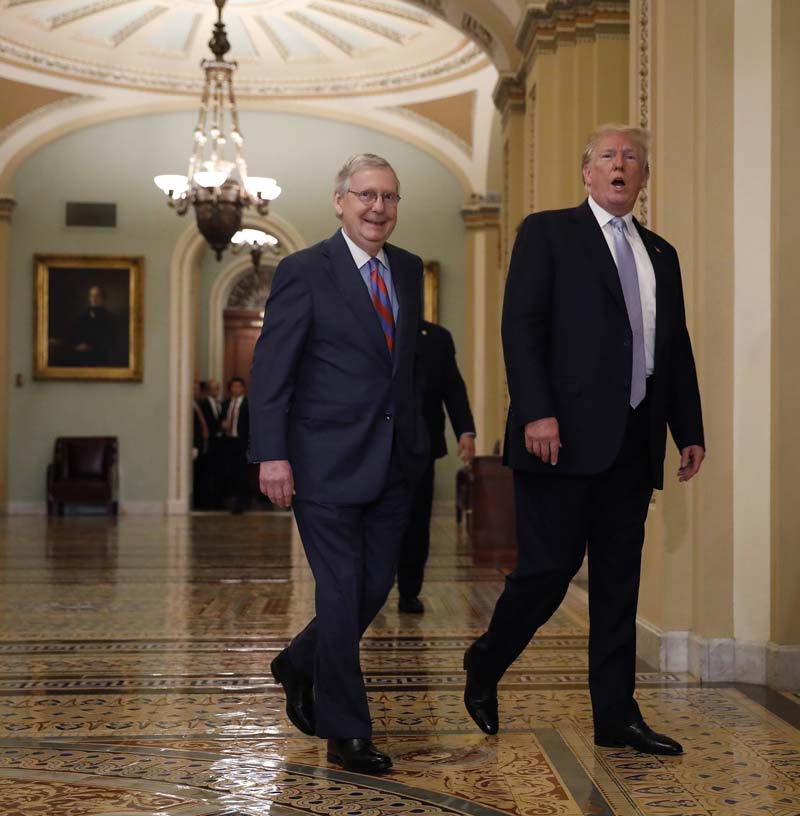 Aaron P. Bernstein for Bloomberg
Aaron P. Bernstein for Bloomberg
Now, the legal and political results of their cooperation will reverberate in American jurisprudence for decades.
Both men are Republicans. Both are in their 70s. And that's it for similarities, folks.
McConnell was born in Alabama, raised in Kentucky and thanks to the demanding therapy of his mother, overcame the crippling physical restrictions of childhood polio so well he became a formidable baseball player.
From then on, it was politics. McConnell was student body president in both high school and the University of Louisville, interned for politicians and at 35, after a stint as a deputy attorney general for Gerald Ford, was elected a county executive back home.
In 1984, he won a U.S. Senate seat, the only Republican to unseat a Democratic incumbent that year. McConnell has been in the Capitol ever since, working his way up, earning colleagues' trust and learning the chamber's arcane rules and twisting legislative pathways.
In 2007, McConnell became his party's minority leader and in 2015, the wily veteran became GOP majority leader. There, he was able to block President Barack Obama's 2016 Supreme Court pick, saying Americans should first have their say in a presidential election year.
That preserved the vacancy created by Justice Antonin Scalia's death for the next president, who happened to be — oh, look! — a Republican named Donald Trump. Using the "nuclear option" adopted by Democrats in 2013, McConnell steered Neil Gorsuch's confirmation through easily.
Although drily witty in private, McConnell has rarely encountered an urge to smile or an interview request he couldn't resist. He works quietly behind the scenes and is the living personification of the Washington GOP establishment that Trump stridently derided throughout the 2016 campaign.
McConnell's political legacy, which Trump is realizing, may well be ensconcing at least two constitutionalist originalists on the nation's highest court and dozens more to lower federal courts where most cases reach their end.
In fact, McConnell's Senate has confirmed 49 federal judges this year alone, 26 of them in the weeks since the Kavanaugh announcement. The gloomy GOP midterm election outlook may have something to do with such unusual efficiency.
As for Trump, his wealthy youth wanted for nothing. No law school, no honors degrees. And not a moment's political experience before becoming commander-in-chief.
Except for some uncharacteristic brief silences recently, Trump has rarely resisted an opportunity to chime in with public barbs about anyone or anything in the political and culture wars of this nation and others. His uncensored tweets reach 55 million in seconds.
Many of the 280-character missives are, in fact, designed to bait media to cover diversionary news, which the tweets successfully do. They are unpredictable, which makes them irresistible in D.C. What's inevitably predictable, of course, is that each calls attention to the man himself.
This strategy also enables Trump to drive his agenda free of media filters, which may often confuse professional observers (and confound aides). But it gives his stalwart supporters a powerful sense that the man they unexpectedly sent to the White House is talking directly to them and "fighting" for (insert here whatever you want him fighting for).
The party's national base has not exactly viewed Beltway Republican leadership as brave Spartans standing stoutly at Thermopylae. So, this time Trump and McConnell both refusing to roll over to opponents' emotional onslaught is not only refreshing but inspiring to their troops as the election nears, not unlike Bill Clinton's willingness to fight resignation suggestions energized his side in the 1998 midterms.
Clearly, many of Trump's fights have been totally unnecessary, unhelpful to his professed goals and, in fact, counterproductive in a traditional political sense. But the steadfast refusal to cave on Kavanaugh by both Trump and McConnell inspired surprising party unity at a crucial time.
And there were some recent signs that Trump was taking some cues on strategic reticence from McConnell.
During the confirmation struggle, did you notice McConnell's sharp retorts to the insults and desperate goads of the Democrats' Chuck Schumer? No, you couldn't because there were none.
During last month's budget legislative struggles, Trump one day observed that actually he wouldn't mind a government shutdown over funding for a border wall.
When asked, McConnell simply said there would be no shutdown, a direct contradiction of the president that surprisingly drew no response.
That's a small sign that this political odd couple, a president with no political experience or discipline and a Senate leader with tons of both are learning to work together. The proof is in what they accomplish that's lasting, like nearly five dozen lifetime judicial appointments so far.
Remember, Trump's book was titled "The Art of the Deal." McConnell's memoir was called "The Long Game." More personally apt book titles are hard to imagine.
(COMMENT, BELOW.)
Andrew Malcolm
McClatchy Washington Bureau
(TNS)
Malcolm is an author and veteran national and foreign correspondent covering politics since the 1960s.


 Contact The Editor
Contact The Editor
 Articles By This Author
Articles By This Author